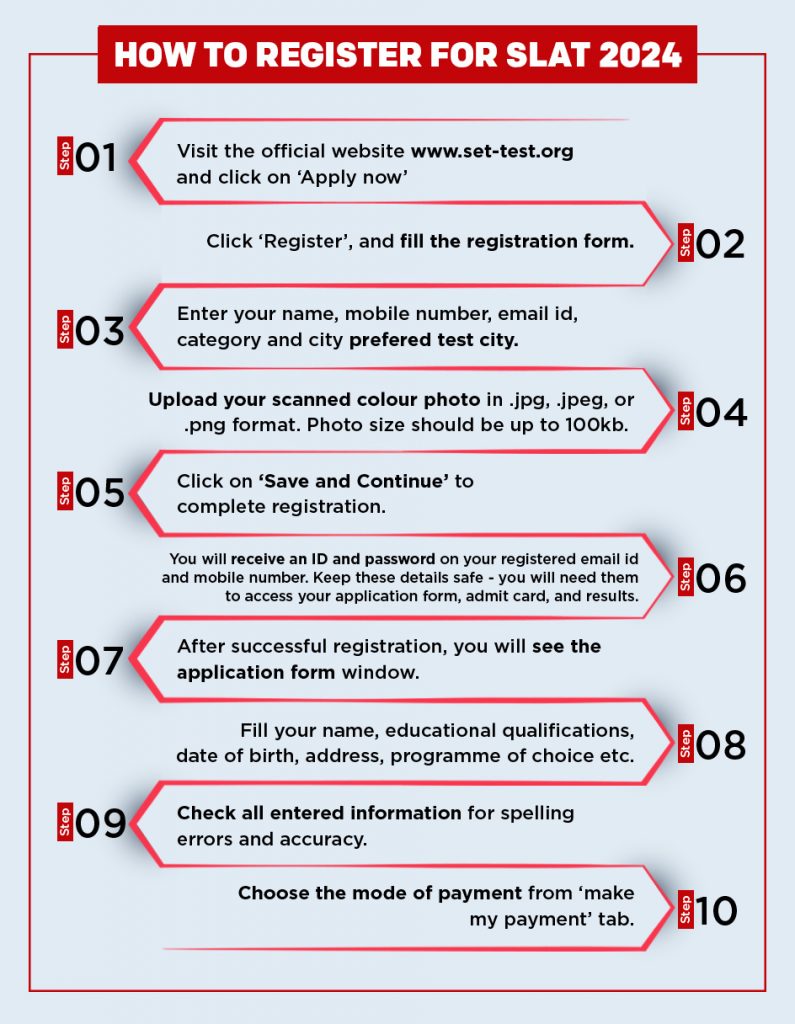The Symbiosis Law Admission Test (SLAT) is the gateway to pursuing law at the prestigious Symbiosis International (Deemed) University, which is among India’s top-ranked private law schools to admit students in 4 Symbiosis Law Schools, namely:
- SLS – Pune
- SLS – Noida
- SLS – Nagpur
- SLS – Hyderabad
All Symbiosis law schools (SLS) are among the top institutions that provide law education. The SIU will conduct SLAT 2025 on December 13, 2024 (Friday) and December 15, 2024 (Sunday).If you’re an aspiring law student, this guide provides a complete roadmap, covering important dates, the syllabus, eligibility criteria, and effective strategies for excelling in SLAT 2025.
1. SLAT 2025 Exam Date and Registration
Knowing key dates is essential for keeping your preparation on track. Here’s a timeline to help you stay organized.
- Application Start Date: Expected in January 2025
- Application End Date: Expected by April 2025
- Admit Card Release: May 2025
- Exam Date: Likely in May 2025
- Result Announcement: June 2025
Keep an eye on the official Symbiosis website for any updates, as dates can be subject to change.
2. Eligibility Criteria for SLAT 2025
Before you apply, ensure you meet the eligibility requirements for SLAT:
- Educational Qualification: Candidates must have completed their Class 12th or an equivalent examination from a recognized board with a minimum of 45% marks (40% for reserved categories).
- Age Limit: There is no upper age limit for SLAT, allowing candidates of any age to appear for the exam.
- Nationality: Both Indian and international students are eligible to apply.
Ensure you meet these requirements, as failing to do so will make you ineligible for admission, even if you perform well in SLAT.
3. SLAT 2025 Exam Pattern
Understanding the SLAT exam pattern is crucial for effective preparation. Here’s what the exam format looks like:
- Mode of Examination: Computer-Based Test (CBT)
- Duration: 1 hour (60 minutes)
- Total Questions: 60 Multiple Choice Questions (MCQs)
- Sections:
- Logical Reasoning – 12 questions
- Legal Reasoning – 12 questions
- Analytical Reasoning – 12 questions
- Reading Comprehension – 12 questions
- General Knowledge – 12 questions
- Marking Scheme: 1 mark per question, no negative marking
Each section tests different skills, so it’s important to build a balanced preparation strategy that targets all areas.
4. Syllabus for SLAT 2025
Knowing the syllabus can help you prioritize subjects effectively. Here’s a breakdown:
Logical Reasoning
- Topics: Syllogisms, logical sequences, analogies, cause and effect, arguments, and deductive reasoning.
- Focus: Practice identifying patterns, drawing logical conclusions, and analyzing arguments.
Legal Reasoning
- Topics: Legal principles, application of law, legal facts, and judgments.
- Focus: Familiarize yourself with basic legal principles and practice applying them to real-world scenarios.
Analytical Reasoning
- Topics: Puzzles, blood relations, series, direction sense, and coding-decoding.
- Focus: Practice solving puzzles and reasoning exercises to enhance problem-solving speed and accuracy.
Reading Comprehension
- Topics: Passages from current affairs, social issues, legal topics, and literature.
- Focus: Improve your reading speed and comprehension skills by practicing passages from newspapers, magazines, and online articles.
General Knowledge
- Topics: Current events, awards, sports, history, politics, and significant national and international events.
- Focus: Stay updated with the latest news, especially in law and politics, by reading newspapers like The Hindu or The Indian Express.
5. How to Prepare for SLAT 2025
Here are some tips to help you succeed in the SLAT exam:
Make a Study Plan
Divide your preparation time by sections, with more focus on areas where you feel less confident. Allocate specific days for each topic and try to complete at least one section every week.
Practice Mock Tests Regularly
Taking mock tests is essential for understanding the exam format and identifying your strengths and weaknesses. Review your mistakes and focus on improvement.
Build Speed and Accuracy
Since SLAT is a time-bound test, practice questions under timed conditions to increase your speed. Use online quizzes or stopwatch techniques to time yourself.
Stay Updated with Current Affairs
Dedicate at least 15 minutes daily to reading the news and current events. Keep a notebook of important facts and dates to review before the exam.
Focus on Core Skills
For sections like logical and legal reasoning, build your skills by solving puzzles, reading legal principles, and understanding basic legal terms. Analytical reasoning can be improved by practicing different problem types, like puzzles and series questions.
6. What to Expect on Exam Day
- Arrive Early: Ensure you reach the examination center well in advance to avoid last-minute stress.
- Bring Required Documents: Carry your admit card, a valid photo ID, and any other required documents.
- Stay Calm: Avoid last-minute cramming. Stay calm, read each question carefully, and manage your time wisely.
7. After the Exam: What’s Next?
After the SLAT exam, follow these steps:
- Check Results: SLAT results are expected to be released in June 2025.
- Participate in the PI-WAT Process: Once results are out, shortlisted candidates will go through the Personal Interaction (PI) and Written Ability Test (WAT), which assess communication skills and critical thinking.
- Prepare Documents: Keep your academic records and other documents ready for the admission process.
Conclusion
SLAT 2025 is an opportunity to begin your law career at one of India’s most reputable institutions. With proper preparation and a balanced approach, you can excel in the exam and gain admission to Symbiosis Law School. Focus on understanding the exam pattern, practicing consistently, and staying updated with current affairs. Remember, success in SLAT isn’t just about hard work; it’s about smart preparation and keeping calm under pressure.
Best of luck on your journey to Symbiosis Law School!



